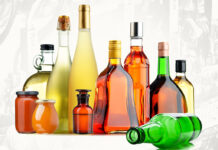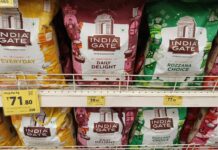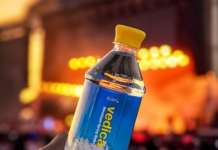Valvert, a natural mineral water brand of the Nestle Group, has launched its new bottle made entirely from recycled PET (rPET). This is the first natural mineral water brand in Belgium to do so. The innovation highlights Nestle’s commitment to have the rPET content in its bottles to 35% worldwide, and to 50% in Belgium, by 2025.
The bottle is another milestone in Valvert’s journey towards sustainability. Nestlé is already working in partnership with local farmers and communities to protect the Valvert natural mineral water source around its bottling facility in Etalle.
The bottle will be available in retail stores this month in Belgium and Luxembourg.
No new plastic needed
The new bottle, a first for Nestle in Europe, is made of 100% recycled PET or rPET. This means Valvert only uses old bottles to produce the new bottle, and no new virgin PET needs to be created. Valvert was able to secure a reliable supply of the high-quality, food grade rPET that is required for bottled water. This will allow not only the launch of the 100% rPET bottle of 150cl, but also a 50% rPET bottle of 50cl at the same time. The goal is to have the 50cl bottle also made entirely of rPET by the end of 2019.
“We believe the new Valvert 100% rPET bottle is a gamechanger in the next generation of sustainable packaging, stimulating a bottle-to-bottle circular economy,” said Emmanuel Gruffat, general manager of Nestle Waters Benelux. “At the same time, we also continue to take our responsibility in further improving our collection and recycling rates in Belgium. That is why last year, Nestle pledged with 8 members of Fevia (the Federation of the Belgian food industry), to collect and recycle 90% of all drink packaging in Belgium by 2022.”
Tackling packaging waste: A priority for Nestle
In January 2019, Nestle laid out its vision that none of its product packaging, including plastics, should end up in landfill or as litter, including in seas, oceans and waterways.
“At Nestle we want to take up our responsibility towards our consumers and help shape a more sustainable future,” said Michel Mersch, chief executive officer of Nestle Belgilux. “We are determined to look at every option available to solve the plastic waste challenge and we are embracing multiple solutions that can have an impact now such as developing new materials, improving collection and recycling schemes and driving new behaviors. R&D is in our DNA and we intend to leverage this expertise to serve this goal. We are therefore proud to launch the new Valvert 100% rPET bottle as another milestone in achieving a circular economy and in our journey towards sustainability.”
A unique partnership with local farmers to protect water source
For over 25 years, Nestle Waters was committed to protecting water resources and the environment by working in partnership with stakeholders.
In 2018, all the local farmers in Etalle (where the Valvert bottling plant and source are located), Nestle Waters, and the Etalle local administration, signed an agreement to protect the Valvert source and the surrounding environment through sustainable farming ‒ 10 farmers use zero pesticides, the Etalle administration does not use chemicals for weeding, and Nestle Waters supports the farmers by providing training and advice from experienced agronomists and bio-engineers. This local and unique partnership ensures quality of the Valvert natural mineral water.
IndiFoodBev — authentic, impactful and influential
An English-language food and beverage processing and packaging industry B2B platform in print and web, IndiFoodBev is in its third year of publication. It is said that the Indian food and beverage industries represent approximately US$ 900 billion in revenues which implies more than 20% of the country’s GDP. Eliminating the wastage on the farmside can help to deliver more protein to a higher number of the population apart from generating sizable exports. The savings in soil, seeds, water, fertilizer, energy and ultimately food and nutrition could be the most immense contribution that country is poised to make to the moderation of climate change.
To improve your marketing and grow sales to the food and beverage processing and packaging industry, talk to us. Our research and consulting company IppStar [www.ippstar.org] can assess your potential and addressable markets in light of the competition. We can discuss marketing, communication, and sales strategies for market entry and growth.
Suppliers and service providers with a strategy and budget for targeted marketing can discuss using our hybrid print, web, video, and social media channels to create brand recognition linked to market relevance. Our technical writers are ready to meet you and your customers for content.
The second largest producer of fruit and vegetables in the world is continuously expanding processing capacities and delivery systems with appropriate innovative technologies. We cover product and consumer trends, nutrition, processing, research, equipment and packaging from farm to thali. Get our 2025 media kit and recalibrate your role in this dynamic market. Enhance your visibility and relevance to existing markets and turn potential customers into conversations. Ask for a sample copy of our bi-monthly in print or our weekly IndiFoodBev eZine each Wednesday.
For editorial info@ippgroup.in — for advertisement ads1@ippgroup.in and for subscriptions subscription@ippgroup.in
Naresh Khanna – 10 February 2025
Subscribe Now











